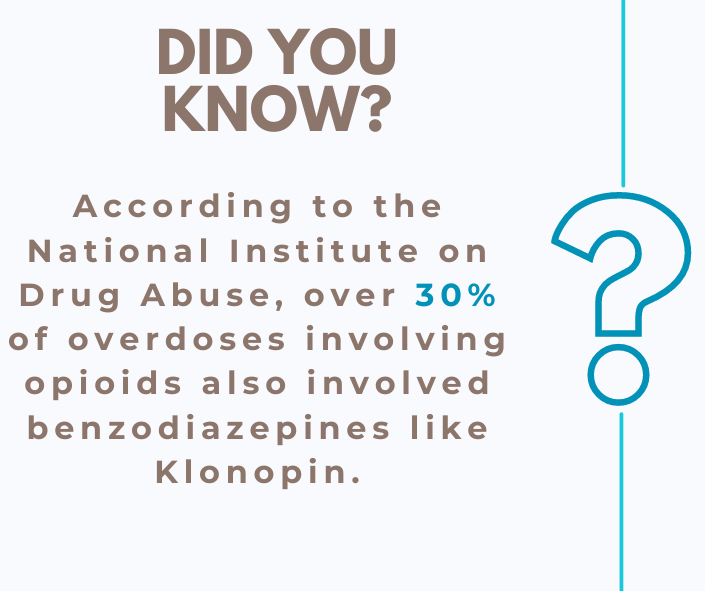Klonopin, or clonazepam, is a highly addictive prescription medication used to treat anxiety and panic disorders. When taken exactly as prescribed, Klonopin can provide short-term relief. However, long-term use often leads to dependence, tolerance, and addiction. At River Rocks Recovery in Middletown, Ohio, we provide comprehensive therapy and associated treatment programs to help you safely detox from Klonopin and build the skills needed for lasting sobriety. With personalized care, evidence-based therapies like CBT and DBT, and outpatient options, we empower you to overcome addiction and reclaim your health and happiness. Call (888) 905-6281 or connect with us online to find support today. A life free from substance abuse starts here.
What Is Klonopin?
Klonopin (half life clonazepam) is a powerful benzodiazepine medication used to treat panic attacks, seizures and anxiety disorders. While potentially helpful when taken as prescribed, it carries a high risk of dependence and addiction.
Understanding What Is the Half Life of Klonopin?
The Half-Life Explained
A drug’s half-life refers to how long it takes for half of the dose to be eliminated from your body. For Klonopin, this ranges from 18-39 hours. So if you take 1mg, after 18-39 hours, 0.5mg will remain.
The long half-life helps explain Klonopin’s high risk for dependence and addiction. Even after stopping, it lingers in your system, causing challenging withdrawal symptoms.
Potent Sedative Effects
This “benzo” drug works by enhancing the effects of gamma-aminobutyric acid (GABA) in the brain. This neurotransmitter helps induce sleep, reduce anxiety, and relax muscles.
Klonopin’s potent sedative and calming effects lead many to misuse it recreationally or self-medicate mental health issues. This greatly increases the overdose risk, especially when combined with other depressants like alcohol or opioids.
High Addiction Potential
Klonopin has a long half-life, meaning it stays in the system longer than other benzos. This raises the likelihood of developing a dependence with continued use. Attempting to quit cold turkey can trigger severe withdrawal symptoms like seizures.
At River Rocks Recovery, our comprehensive addiction treatment programs utilize evidence-based therapies and outpatient services provide the support needed to overcome Klonopin dependence safely.
Klonopin Uses
Klonopin (clonazepam) is a benzodiazepine medication primarily used to treat certain types of seizure disorders and panic disorders. Its therapeutic uses include:
Anti-Seizure
- Controlling certain types of seizures in patients with epilepsy who have not responded to other medications.
- Preventing further seizure activity in patients with Lennox-Gastaut syndrome, a severe form of childhood epilepsy.
Anti-Anxiety
- Treating panic disorder with or without agoraphobia. It can help reduce the frequency and severity of panic attacks.
- Short-term relief of severe anxiety symptoms before starting other therapy.
Insomnia and Restless Legs Syndrome
In some cases, clonazepam may be prescribed off-label to provide short-term treatment for:
- Insomnia related to anxiety disorders.
- Restless legs syndrome (RLS) and periodic limb movement disorder (PLMD).
Klonopin Side Effects and Warnings
Common Side Effects
Klonopin (clonazepam) can cause drowsiness, dizziness, and problems with coordination. Other common side effects include:
- Fatigue
- Slurred speech
- Headaches
- Dry mouth
Serious Risks
More severe side effects may occur, especially with high doses or long-term use. These include:
- Respiratory depression
- Dependency and addiction
- Increased risk of falls
- Suicidal thoughts or actions

Klonopin Overdose and Addiction
Klonopin (clonazepam) is a potentially addictive benzodiazepine that can lead to overdose and life-threatening complications. According to the National Institute on Drug Abuse, over 30% of overdoses involving opioids also involved benzodiazepines like Klonopin.
Overdose Risks
Taking too much Klonopin can dangerously depress breathing and brain activity. Overdose signs include:
- Severe drowsiness
- Confusion and dizziness
- Slurred speech
- Loss of coordination
- Coma or unconsciousness
Addiction Dangers
Klonopin produces calming effects that can lead to misuse and addiction. With continued use, the brain becomes dependent, requiring higher doses to achieve the same effect. Abrupt discontinuation can cause intense withdrawal symptoms like seizures.
Klonopin Withdrawal and Getting Help
Professional Detox Program
For those struggling with Klonopin addiction, suddenly stopping use can trigger severe withdrawal symptoms like seizures, psychosis, and suicidal thoughts.
Intensive Outpatient Therapy
Once stabilized, clients transition into an intensive outpatient program (IOP) providing counseling, therapy, and support. Services like cognitive behavioral therapy (CBT) and dialectical behavior therapy (DBT) help identify triggers, develop coping mechanisms, and prevent relapse. Group sessions foster connection and accountability.
Continuing Care
Long-term recovery requires an ongoing commitment. River Rocks’ outpatient program provides a seamless step-down level of care with individual and group therapy, medication management, and community resources. Alumni events keep you engaged and motivated on your sobriety journey.
Conclusion
While it can serve a medical purpose when used responsibly, Klonopin also carries serious dangers. If you or a loved one are struggling with Klonopin addiction, the caring team at River Rocks Recovery is here to help. Their personalized programs like PHP, IOP and outpatient therapy utilize proven techniques like CBT, DBT and counseling. Take the first step and contact them today to learn more about recovering from Klonopin dependence and regaining control of your life. Call (888) 905-6281 or connect with us online to find support today. There are brighter days ahead.
Klonopin FAQ
Common Questions About Klonopin
Klonopin (clonazepam half life) is a benzodiazepine prescribed for seizures, panic disorder, and anxiety. While it can be effective for short-term use, it carries risks of dependence and addiction with long-term or recreational misuse.
How Addictive is Klonopin?
Klonopin has a high potential for abuse and addiction due to its potent effects on the brain’s GABA receptors. With repeated use, the brain becomes dependent on Klonopin to feel “normal,” leading to withdrawal symptoms when trying to quit.
Signs of Klonopin Addiction
- Continued use despite negative consequences
- Unsuccessful efforts to cut down or control use
- Spending excessive time/resources obtaining and using Klonopin
- Cravings and preoccupation with obtaining more Klonopin




























